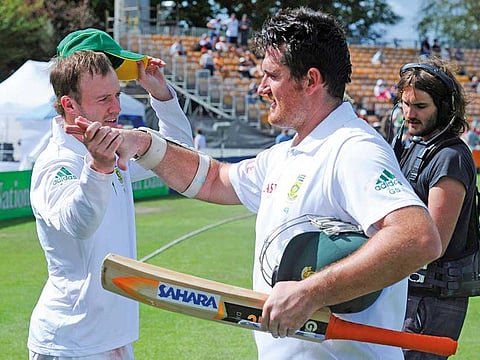AB’s loss is irreplaceable, Smith says
South Africa must prepare for a tricky transition, former captain says

Mumbai: The untimely retirement of “irreplaceable” AB de Villiers is a big loss for South Africa and the team must prepare for the challenging transition they face in the next couple of years, former captain Graeme Smith has told Reuters.
The South African batting talisman announced his retirement from all forms of international cricket last week after a glittering career spanning close to 14 years.
The 34-year-old’s audacious batting style and breathtaking fielding has made him one of the sport’s leading lights and there is barely a dull moment for the spectators when De Villiers is on the cricket field.
“I think AB’s thought about it a lot,” Smith, who himself made a shocking retirement at the age of 33 four years back, said in an interview.
“I thought definitely he would retire after the 2019 World Cup. But when he made his comeback and did so well in the home summer in South Africa, had a really good IPL (Indian Premier League), I didn’t even think about it.”
De Villiers retired with a Test average of 50.66 and as the fourth-highest scorer for South Africa with 8,765 runs.
In ODI cricket, he holds the records for the fastest 50 (16 balls), 100 (31 balls) and 150 (64 balls) with those innings exhibiting his 360-degree batting ability, much to the amusement of the fans.
“Ultimately people will be very disappointed because they are going to miss him, just because he was that brilliant. They wanted to see him play more,” Smith said at the sidelines of the Ceat Cricket Rating awards.
“But the guy has played international cricket for around 15 years… More than anything he has the right to decide when he’s had enough. He will have his own reasons for that, you got to respect that.”
Smith does not expect De Villiers to make himself available to play in different Twenty20 leagues across the globe but hoped the batsman will continue entertaining fans for at least a couple of years more.
“It’s a challenge international cricket really does face,” Smith said. “The way world cricket is at the moment, the International Cricket Council and administrators have to be really at the top of their game in terms of player workloads, creating context in our cricket.
“There are not many players who have played for 14-15 years that can travel nine, 10, 11 months a year, deal with the pressures, plus the family pressures, it’s very, very difficult.”
Smith said De Villiers’ retirement robbed South Africa of more than just a batting mainstay. “To lose a player like AB, he’s irreplaceable,” Smith said. “There are also quality players there but it’s like taking Virat Kohli (India captain) out of the Indian team.
“Everyone will say it’s a big loss. More than anything the South African team loses a X-factor player, who can single-handedly win you a game.”
South Africa have lost players to English counties in recent past with cricketers like fast bowler Morne Morkel registering as Kolpak players. A player becomes eligible for a Kolpak deal when he gives up the right to play for his country and is not classed as an overseas player in county cricket.
Smith also had doubts about the future of long-serving players like Hashim Amla and current captain Faf du Plessis.
“I think South African cricket is going to find itself in a very interesting phase in the next year or so,” Smith said. “I don’t think the talent pool is quite as good as what it has been for a period of time.
“If a couple of players walk away after the 2019 World Cup, it’s going to take a little bit of time for the team to rebuild.
“It’s going to be interesting to see players like Hashim and Faf if they play for another year or two after the World Cup. If they don’t, it’s going to be a challenging period and something South African cricket needs to be aware of.”


